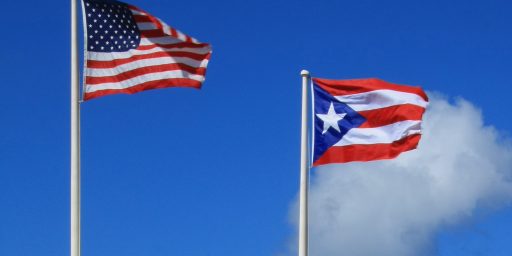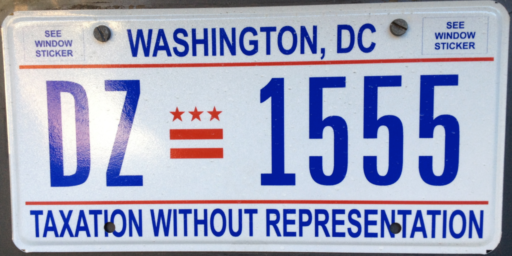Giving D.C. A Vote in the House
The Washington Post editorial page advocates giving the District of Columbia “A Vote in the House.”
WHEN THE HOUSE of Representatives votes on federal taxes or decides solemn questions such as when citizens must go off to war, the District’s representative, Eleanor Holmes Norton, has to stand and watch as her Democratic and Republican colleagues decide the fate of her constituents. Despite having served and died in 10 wars and paid billions in federal taxes, D.C. residents are still voteless in Congress. That inexcusable situation exists despite polls showing that the American public favors congressional representation for D.C. residents. Today Rep. Thomas M. Davis III (R-Va.) will launch a second effort to rectify at least half of the problem by sponsoring a bill that gives the District a vote in the House. The measure would still leave the District unrepresented in the Senate. The Davis proposal, however, is a substantial advance in D.C. voting rights and deserves strong bipartisan support in Congress.
Mr. Davis’s measure would achieve the goal of giving the District a single vote by increasing the size of the House by two and reapportioning seats. Given the most recent census, the likely result would be an extra seat for Utah along with the District. And given party registration and voting patterns in the two jurisdictions, the Utah seat is likely to be held by a Republican and the District’s by a Democrat. The new arrangement would last, under Mr. Davis’s proposal, until the regular 2012 reapportionment, at which time the House would revert to 435 members to be divided by population among the District and the states. No matter what happens to the size of Utah’s delegation at that point, the District would keep its seat.
This is blatantly unconstitutional, as Article I, Section 2 of the U.S. Constitution makes clear:
Clause 1: The House of Representatives shall be composed of Members chosen every second Year by the People of the several States, and the Electors in each State shall have the Qualifications requisite for Electors of the most numerous Branch of the State Legislature.
Clause 2: No Person shall be a Representative who shall not have attained to the Age of twenty five Years, and been seven Years a Citizen of the United States, and who shall not, when elected, be an Inhabitant of that State in which he shall be chosen.
Clause 3: Representatives and direct Taxes shall be apportioned among the several States which may be included within this Union, according to their respective Numbers, which shall be determined by adding to the whole Number of free Persons, including those bound to Service for a Term of Years, and excluding Indians not taxed, three fifths of all other Persons. (See Note 2) The actual Enumeration shall be made within three Years after the first Meeting of the Congress of the United States, and within every subsequent Term of ten Years, in such Manner as they shall by Law direct. The Number of Representatives shall not exceed one for every thirty Thousand, but each State shall have at Least one Representative; and until such enumeration shall be made, the State of New Hampshire shall be entitled to chuse three, Massachusetts eight, Rhode-Island and Providence Plantations one, Connecticut five, New-York six, New Jersey four, Pennsylvania eight, Delaware one, Maryland six, Virginia ten, North Carolina five, South Carolina five, and Georgia three.
Clause 4: When vacancies happen in the Representation from any State, the Executive Authority thereof shall issue Writs of Election to fill such Vacancies.
Clause 5: The House of Representatives shall chuse their Speaker and other Officers; and shall have the sole Power of Impeachment.
This is not difficult: The District of Columbia. Is. Not. A. State.
Congressman Davis should be ashamed of himself for proposing this legislation. Which, ironically enough, demonstrates quite clearly why the Framers did not make the District a state: The entire Membership of both Houses of Congress lives in or around D.C. This tiny speck of geography, which would scarcely exist were it not the seat of government, would for all intents and purposes have 435 congressman and 100 senators.
Related:
DC Statehood
DC Statehood Revisited
D.C. Statehood Redux: Retrocession




The entire Membership of both Houses of Congress lives in or around D.C.
None of the members living in the District are citizens (or permanent residents) of the District and, hence, wouldn’t be able to vote, run for office, etc…
A better plan would be to make DC a state. We can dump Wyoming while we’re at it–there’s less people living there than in the District.
A better plan, which I outlined in my blog, would be cede back to Virginia the land it ceded to the Government that is not occupied by public buildings, and to cede back to Maryland the land it ceded to the Government that is not occupied by public buildings, and they would be represented by either Virginia or Maryland representatives and senators.
kappiy: My argument isn’t that the Members would vote there but that, because that’s where they live, they’d be incredibly sympathetic to the District on the issues.
Don: Actually, Virginia took its part back in the 1830s. The rest was Maryland’s. I outlined a similar retrocession plan last year, too. (Now added to the post as “Related.”) I think it’s a good solution.
So have Maryland voters elect a rep for D.C.! Technically constitutional, I think, if unsatisfying.
Anderson: Pretty sure it would be unconstitutional. One man, one vote and all that.
But wait, I peruse the Constitution, and it doesn’t say “one man, one vote” anywhere. We have Scalia & Thomas’s votes now …
Anderson: True that 1M1V was a Court creation (Baker v Carr, 1962). I don’t think the Court’s two most originalist Justices are the likeliest supporters of such extraconstitutional efforts, however.
First, there are indeed full-time residents of the District, unattached to the ever-transient federal government.
But instead of giving them a vote, let’s put the emphasis on the other side of the equation: taxes. Do away with federal taxes on full-time residents (and businesses) in DC. That would nullify the sentiment of the silly license plate and still be honorable.
Until DC votes other than D=98% R=2%, they’re simply not going to get a representative. It’d just be a freebie for one party.